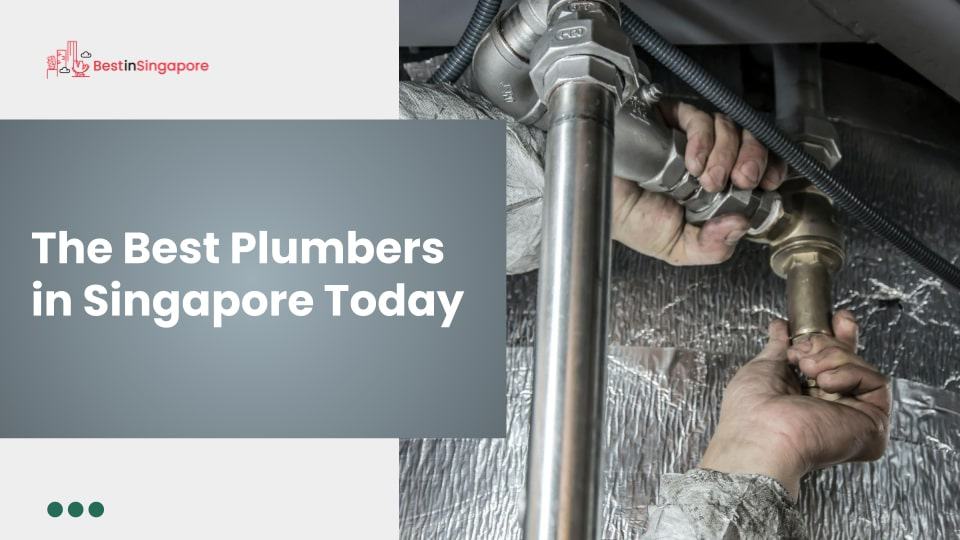The 9 Best Plumbers in Singapore – Reviewed
For your plumbing woes, we trained our sights on plumbing companies that don’t just give customers value for money but also flexible scheduling, warrantied work, and more.
Before proceeding to our reviews of reliable plumbers in the country, let’s take a closer look at how much you can expect to pay for these experienced plumbers’ services.
How much do plumbers charge in Singapore?
To help you gauge how much plumbing services cost in the country, we created a table with some of the most common plumbing issues in the country. For convenience, we made sure to indicate the rates from the cheapest to the costliest.
Please note that while the rates are estimates, some companies (like Mr Plumber SG) are careful to point out that their fees already include all prices, materials, labour, and transport.
The available pricing on their respective websites is there for guidance and could change with client circumstances.
The Best Singaporean Plumbing Services Today
To give you only the best plumbing services in Singapore, our criteria for this listicle included the following important factors:
1. Greenwood Electrical & Plumbing Services

| Title | Info |
|---|---|
| SERVICES | Clearing blockages and choke, sink/basin taps, bath mixer taps, wash basin, sink, toilet bowl, piping, bottle trap, bidet, bathtub, shower head, cistern, stop valve, water heater instant/storage, water/sanitary waste pipes, WC/urinal manual/sensor flush valve, stainless steel, copper, PVC, PPR pipes, burst pipes, pipework maintenance, water tank pressure pump service, transfer/booster pump, gate valve services, plumbing service and maintenance, high-pressure water jetting device, complete full-service plumbing |
| WEBSITE | https://www.greenwoodplumbingsg.com/ |
| ADDRESS | Suites@ Bukit Timah 68 Jalan Jurong Kechil #01-14 Singapore 596180 |
| CONTACT DETAILS | 6467 2493 |
| OPERATING HOURS | 24-hour emergency plumbing services |
Total Scores
Since 1984, Greenwood Electrical & Plumbing Services has been providing Singapore residents and business owners with plumbing-oriented professional help. A quick look at the services it provides underlines this commitment.
Greenwood plumbers perform installation, repairs, and maintenance work that encompasses washroom and kitchen concerns. And it does these on a 24/7 emergency service setup, which is convenient for those late-night leaks or clogs.
The downside is that the company doesn’t readily provide a pricing guide. This would’ve been convenient if you were canvassing for the best rates among plumbers in Singapore.
And while Greenwood does promise a transparent charging system and “economical charges,” a rates chart (along with warranty information) would’ve been a nice touch.
Clients have mentioned its reasonable rates. But in the absence of an online reference, we’re happy that offering potential clients free quotes makes up for it (especially given its impressive range of services).
Pros
- 24-hour emergency services
- Full range of plumbing, installation, maintenance, and repair services
- Caters to residential and commercial clients
- Island-wide service reach
Cons
- Doesn’t offer a service price guide
- No warranty information provided
- No free quotes offered
2. Home Plumbers
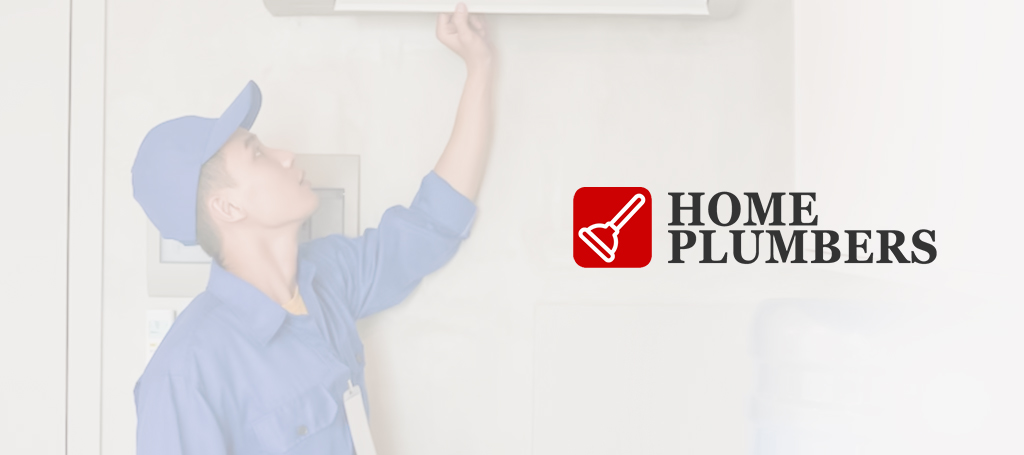
| Title | Info |
|---|---|
| SERVICES | Bathroom plumbing, leaks and pipe repair, toilet choke and drainage |
| WEBSITE | https://homeplumbers.com.sg/ |
| ADDRESS | Block 153 Batok Street 11, Singapore 650153 |
| CONTACT DETAILS | [email protected] |
| OPERATING HOURS | 24-hour emergency services |
Total Scores
With over 20 years of plumbing experience, Home Plumbers states that “No job is too small for us!” So for most of us, that should include everything from burst pipes to showers that are too cold to take.
The plumbers provide a transparent pricing scheme, which we appreciate.
Home Plumbers promise no hidden fees, and it’s quite heartening to see some of the cheapest rates for things like clearing a clogged floor trap (with national averages between $60 and $150) go for just $40 here.
But we still have reservations about this company. While it mentions certain service guarantees, they aren’t readily offered in one go.
For instance, things like shower head replacements and toilet bowl installation come with a 12-month warranty, while there’s no clear indication of guarantees for things like clear bathroom choke repairs.
Those are just small nitpicks in an otherwise nearly ideal plumbing setup. A big plus for us is their responsiveness.
The Home Plumbers customers we asked got an immediate response to plumbing emergencies island-wise, 24 hours and seven days a week.
Also, to provide speedy services, the company employs local plumbers for faster emergency responses per area!
Pros
- Affordable rates
- 24-hour emergency services
- Island-wide service reach
- Offers free consultation
- Engages local plumbers per area for faster response
Cons
- No clear service guarantee information for some services
- 12-month warranty only for replacements and repairs
3. MR Plumber SG
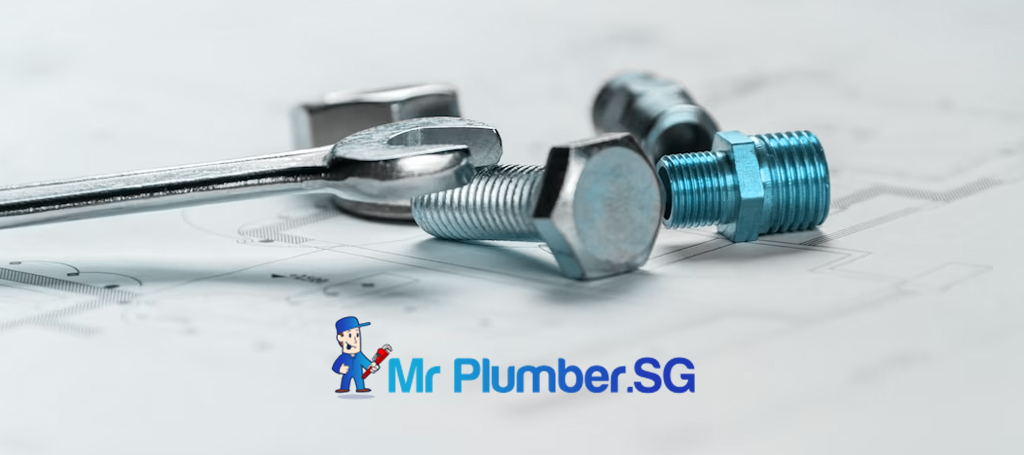
| Title | Info |
|---|---|
| SERVICES | Manual and/or latest machinery to clear clogs and chokes, new installation and plumbing repair of dozens of kitchen and bathroom areas, leakage issue solutions for practically all pipes, taps, faucets, showers, etc. |
| WEBSITE | https://www.mrplumber.sg/ |
| ADDRESS | 1090 Lower Delta Road #03-07A, Singapore 169201 |
| CONTACT DETAILS | +65 6980 0909
WhatsApp / Message Number: +65 8241 0032 |
| OPERATING HOURS | Monday to Sunday: 9 AM - 9 PM |
Total Scores
Mr Plumber Singapore has more than a decade of plumbing experience and has been featured multiple times on media and review sites. All of its plumbers are PUB-licensed, so clients can rest assured that their plumbing needs are in good hands.
The company is no stranger to plumbing emergencies, which can be addressed by using the WhatsApp button on the site for faster response.
However, Mr Plumber currently has no 24-hour emergency services to offer, though it’s open from Mondays to Sundays.
A quick price comparison may seemingly show they have steeper rates for some common plumbing services. But as the company mentions, all of its prices already include transport, material, and labour fees—making the rates quite reasonable.
There is a token service charge for inspection, but it can be waived should the client engage Mr Plumber’s services.
The services also come with a warranty, though customers need to call first to clarify the period involved. These enquiries are important because Mr Plumber aims for full transparency, especially with plumbing tasks on a case-by-case basis.
Pros
- All prices are inclusive of material, labour, and transport
- No 24-hour emergency services
- Employs PUB-licensed plumbers only
- Different warranties offered
Cons
- No 24-hour emergency services offered
- Small token plumber service charge for inspection (waived if plumbing services are engaged)
- Warranty needs to be clarified by calling first
4. Plumber Singapore

| Title | Info |
|---|---|
| SERVICES | Toilet bowl choke, floor trap/drain choke, sink choke, pipe leak/burst, faulty tap leak, toilet bowl flush leak, conceal pipe leak, bidet installation, water heater repair and installation, toilet bowl replacement and conversion |
| WEBSITE | https://www.24hrsingaporeplumber.com/plumbing-services/ |
| ADDRESS | 20 Maxwell Road Singapore, 069113 |
| CONTACT DETAILS | 1800 833 2133
8199 3422 6774 6009 |
| OPERATING HOURS | Available 24/7 |
Total Scores
Plumber Singapore aims to respond to most emergency cases within 30 minutes to an hour (which is great for when your place is about to get flooded!). Its 24-hour hotline is a convenient feature that’s a great addition to the company’s island-wide reach.
All of its plumbers have PUB licenses (great if you need major plumbing work!), and it’s a duly licensed business with an ACRA registration. As such, the company doesn’t provide pricing by the hour but by the job.
The reason that Plumber Singapore gives for the absence of a price guide is that it’s difficult to determine the extent of the problem via verbal description only. We think that the warranty provided with each job makes up for this somewhat.
The service rates also don’t include transport fees yet. Residential transport charges are as follows:
- 8 AM – 6 PM: $10 – $30
- 6 PM onwards: $20 – $40
- 9 PM onwards: $30 – $50
As you can see above, residential transport charges increase later in the day, which is unfortunate for homeowners facing plumbing issues during late hours.
However, the company doesn’t get any cut from the transport charges, as everything is paid to reimburse the plumber’s time and effort (especially after office hours). We appreciate this disclaimer.
Pros
- Offers a 90-day service warranty
- Free plumbing assessment
- Caters to residential and commercial clients
- 24/7 hotline available
- Employs PUB-licensed plumbers only
Cons
- No price guide readily provided
- Warranty period needs to be clarified depending on plumbing job
- Transport residential charges increase as the day gets later
5. Fixwerks

| Title | Info |
|---|---|
| SERVICES | Kitchen, laundry, and washroom plumbing services |
| WEBSITE | https://www.fixwerks.com/ |
| ADDRESS | 55 Serangoon North Avenue 4, #06-11, Singapore 555859 |
| CONTACT DETAILS | +65 6765 8890 (urgent repairs) |
| OPERATING HOURS | Monday to Friday: 9 AM - 6 PM |
Total Scores
While Fixwerks isn’t strictly a plumbing specialisation provider, it still makes it to this listicle for several good reasons. For starters, its plumbing repair services are pretty comprehensive and address most kitchen, laundry, and washroom plumbing concerns.
For another, its company profile is quite impressive with plenty of technicians, an operations team, and customer advocates on staff.
They have live chat window support and forms for new enquiries and follow-up concerns as well. We tested these and found them to be fairly speedy in responding.
There’s no price guide readily available on its site, but it touts transparent and fair pricing with no hidden charges in the mix. Repairs are also guaranteed for 12 months to give customers peace of mind about the quality of the work it does.
Another downside, however, is that there aren’t 24-hour emergency plumbing services at Fixwerks. Still, there’s a hotline for urgent repairs even if the company’s operating hours don’t extend to the weekends.
Pros
- Repairs guaranteed for up to 12 months
- Nationwide coverage
- One-stop plumbing and other utility repair services
Cons
- Plumbing isn’t the primary company specialisation
- Doesn’t provide a price guide
- Open only on weekdays
- No emergency plumbing services offered
6. Singapore Plumbing

| Title | Info |
|---|---|
| SERVICES | Clearing of floor trap choke, toilet bowl, basin choke, kitchen sink choke, conceal pipe choke, urinal choke, repair and replacement of water tap, mixer tap, basin waste, bottle trap, toilet bowl flush systems, whole house uPVC, copper pipe, stainless steel, supply and install water heater, toilet bowl set, basin set, repair or conceal copper pipe leakage, waterproofing, leakage repair |
| WEBSITE | https://gseplumbing.sg/ |
| ADDRESS | 10 Anson Road #05-16, International Plaza (S) 079903 |
| CONTACT DETAILS | 8127 0120 |
| OPERATING HOURS | Available 24/7 |
Total Scores
Singapore Plumbing has over 20 years of accredited plumbing experience, with 24-hour emergency services, to boot. There are transparent pricing and fair rates plus a price guide in case you’re canvassing plumbers for your home or office needs.
To start with, the rates are great at Singapore Plumbing. For instance, clearing a floor trap choke averages around $80, but this company can do it starting at just $60.
The services are mostly plumbing-oriented like clearing chokes, repairs, replacements, supplies, and installation of parts, though rubbish chute repairs are on the menu too.
And while there’s a price guide offered, the scope and gravity of the plumbing issue can still influence the customer’s final invoice.
But what makes Singapore Plumbing a shoo-in for this review is its 60-day warranty for reliable servicing. It isn’t much compared to others on this list, but we’ll take it as a vote of confidence for its accredited plumbers’ skills and expertise any day.
Pros
- Offers a 60-day warranty for services.
- 24-hour emergency services available
- Reasonable rates
Cons
- Rates subject to the scope of plumbing issue
- No price guide for other services
- Warranty duration is shorter than competitors’
7. Tom Plumbing
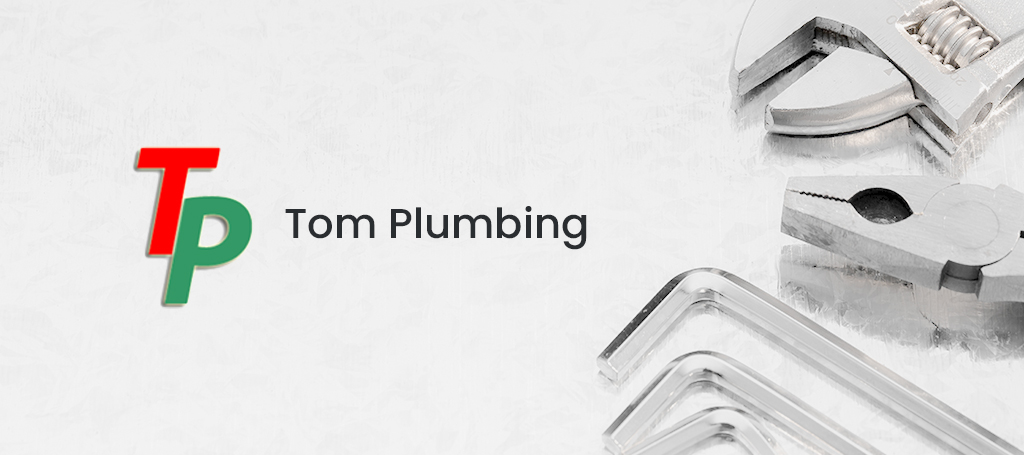
| Title | Info |
|---|---|
| SERVICES | Running of water supply pipes, drainage pipes (uPVC/cast iron), floor traps, installation of kitchen accessories, toilet accessories, water heaters, replacing grating covers, water filtration system and water hammering detection |
| WEBSITE | https://tomplumbing.com.sg/ |
| ADDRESS | 10 Buroh Street #08-22, West Connect, Singapore 627564 |
| CONTACT DETAILS | +65 6777 2098
9675 3106 |
| OPERATING HOURS | By appointment |
Total Scores
Right off the bat, Tom Plumbing gives potential clients a free, no-obligation quotation for any plumbing problem they may have. The company has 35 years of experience under its plumber’s belt, so this is quite an offer to make.
Tom Plumbing does a “strategic analysis” of a customer’s floor plan before any installation or repair job even starts.
It’s a company that adheres to PUB plumbing practices and likes to look at the bigger picture (for future repair or maintenance work in customers’ homes or businesses).
However, its service rates do reflect this stringent quality assurance. General repairs can cost upwards of $120, while rubber expansion joint replacements cost $400 and up!
Services are strictly by appointment and require two images (a zoomed-in plus a general layout one) before engaging its services.
The clients we interviewed explained that this may be because of Tom Plumbing’s efficiency and its aim for customer satisfaction.
We understand its dedication to high-quality services, especially since it’s had its share of impressive corporate clients (including 7-Eleven Singapore and the International Plaza Singapore).
Pros
- Free quotes offered
- Available services for commercial and industrial clients
- Impressive corporate portfolio
- PUB-standard compliant practices
Cons
- No 24-hour emergency services
- Website is currently down
- Rates are a bit steeper than others’
- Ad hoc jobs require picture attachments for estimates
8. Yeobuild Home Repair
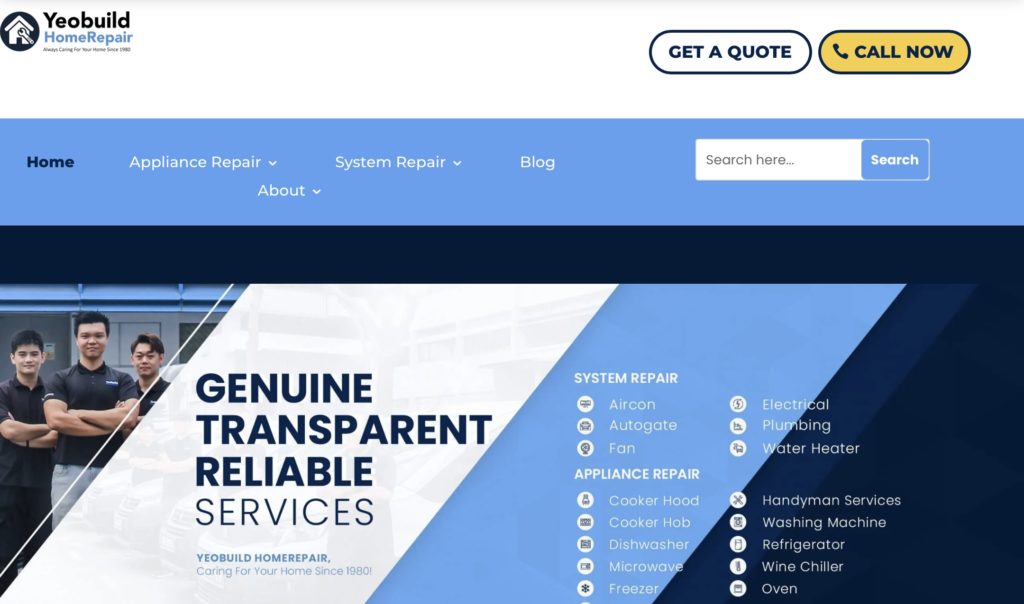
| SERVICES | SYSTEM REPAIR Aircon Autogate Fan Electrical Plumbing APPLIANCE REPAIR Water Heater Cooker Hood Cooker Hob Dishwasher Microwave Freezer Washing Machine Refrigerator Wine Chiller |
| WEBSITE | https://yeobuild.com.sg/ |
| ADDRESS | Yeobuild Private Limited 5000 Ang Mo Kio Avenue 5 TechPlace 2 #02-10 Singapore 569870 |
| CONTACT DETAILS | +65 6746 6177 [email protected] |
| OPERATING HOURS | Open 24/7 via chat |
Total Scores
In our quest for top-notch plumbing services, we found Yeobuild Home Repair to be a beacon of excellence.
With a remarkable combination of expertise and customer-centricity, they’ve left an indelible mark on our plumbing needs.
Our journey with Yeobuild Home Repair began with a leaky faucet. Their response was nothing short of impressive.
Within hours, their skilled technicians were at our doorstep, diagnosing the issue with surgical precision. It was clear from the start they take their craft seriously.
The repair job was executed flawlessly, leaving us with a faucet that felt brand new. Our plumbing problems have since become theirs, and they’ve consistently proven themselves as the go-to experts in their field.
One of the standout aspects of Yeobuild Home Repair is their unwavering commitment to convenience. Scheduling appointments was a breeze, and their punctuality was truly refreshing.
No more waiting around for hours for a technician to arrive. They know the value of our time, and it shows in their professionalism.
Their well-equipped vans carry a treasure trove of tools, ensuring most issues are resolved in a single visit. It’s like having a plumbing superhero on speed dial.
Reputation is often the yardstick by which companies are measured, and Yeobuild Home Repair sets the bar high. Their reputation in the industry is not just well-deserved; it’s enviable.
Word of mouth brought us to their doorstep, and it’s no surprise why. Our friends and neighbors had already experienced their stellar service, and we can now proudly join the chorus of satisfied customers.
Trust is a currency they’ve earned, and they guard it zealously.
However, they don’t offer promos yet. We recommend checking their website for other affordable deals.
Pros
- Expertise
- Convenience
- Reputation
- Affordability
Cons
- Busy during peak days
9. ADM Plumbing Services Singapore
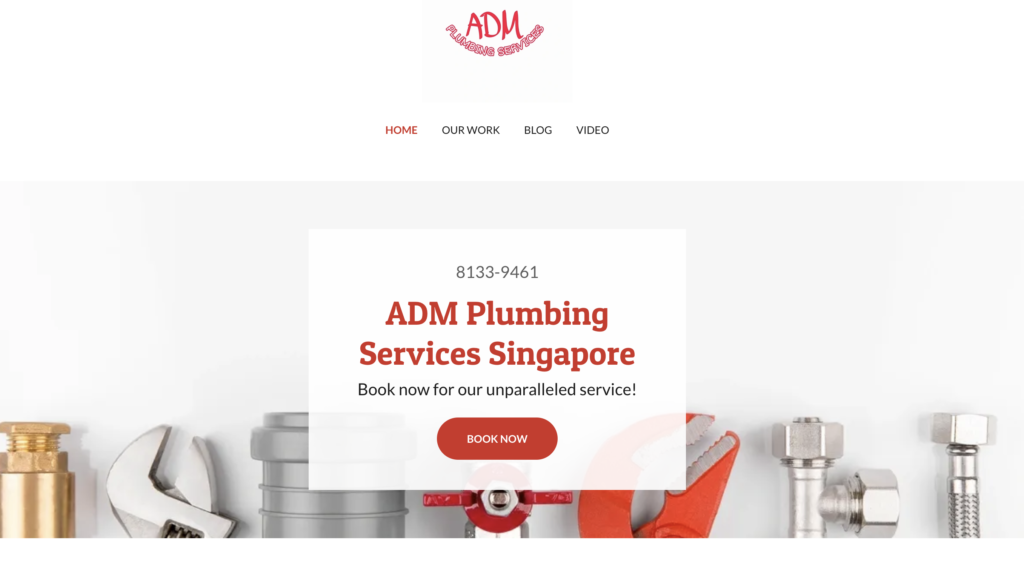
| Title | Info |
|---|---|
| SERVICES | All-around plumbing services |
| WEBSITE | https://singaporeplumbingadm.com/ |
| ADDRESS | 280 Woodlands Industrial Park E5, Singapore 757322, Singapore |
| CONTACT DETAILS | +65 8133 9461 |
| OPERATING HOURS | 24/7 |
Total Scores
With more than a decade of experience, ADM Plumbing Services Singapore has established a solid reputation for their expertise in handling various plumbing issues.
Their knowledgeable team has served a wide range of customers, ensuring that plumbing problems are fixed to utmost satisfaction. Clients can rely on their expertise to provide effective solutions.
Plumbing emergencies can happen at any time, and ADM Plumbing Services Singapore understands the urgency of such situations. They offer 24/7 emergency service, ensuring that clients can receive prompt assistance whenever sudden plumbing problems arise. This availability provides peace of mind, knowing that reliable help is just a phone call away.
ADM Plumbing Services Singapore takes pride in delivering the very best service to their clients.
Whether it’s a simple faucet installation or a complex plumbing issue, their team of reliable professionals strives to exceed expectations. They are committed to providing high-quality workmanship and ensuring that each client receives top-notch service.
Recognizing that each plumbing project is unique, ADM Plumbing Services Singapore offers individualized options to meet the specific needs of clients.
They provide a free online consultation, where they explain all available plumbing solutions and assist clients in choosing the scope of work that best suits their requirements. This personalized approach ensures that clients can make informed decisions about their plumbing projects.
However, while the company mentions that they offer services and warranties for plumbing jobs, the specific durations and terms of these warranties are not mentioned in the provided description. Clients may need to inquire directly with ADM Plumbing Services Singapore to gain a comprehensive understanding of their warranty policies.
Pros
- Knowledge and Experience
- 24/7 Emergency Service
- Reliable Professionals
- Individualized Plumbing Options
Cons
- Lack of Warranty Details

